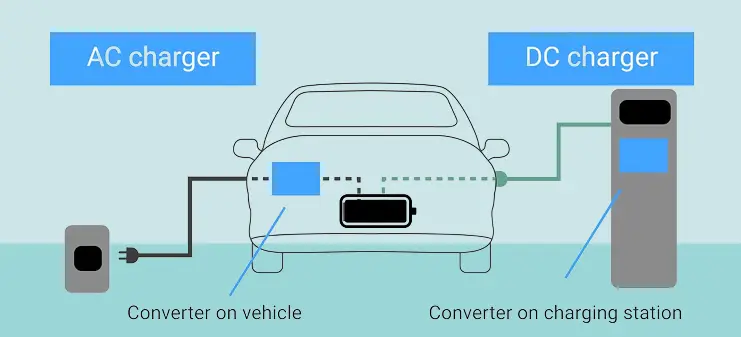AC Vs. DC EV Charger: The Full Guide

Introduction
With the increase in electric vehicle (EV) adoption across the globe and in India; it becomes very important to understand the economics of the EV charging infrastructure as well. AC EV charger (alternating current) and DC (direct current) fast EV charging station are the main methods of charging electric vehicles. In this blog, we will examine the economics of AC and DC charger, considering various factors.
Please refer https://www.pmelectronics.com/ev-charging-station/ or https://www.pmelectronics.com/ev-chargers-accessories/#frequently-asked-questions to know about what is an AC and DC Charger.
Installation Cost
AC EV Charger:
AC EV charger are cheaper to install when compared to the intial cost of DC EV charging station. AC EV Charger uses existing grid infrastructure, and most homes and buildings already have the electrical wiring needed for the same.
The installation costs of AC EV Charging Station mainly includes the purchase and installation of the EV charging equipment and some minor extension cable cost. This makes them suitable for home chargers, overnight chargers, parking bay chargers or commercial chargers which can afford 4-5 hours charging time.
DC EV Charger:
DC fast EV charging station require special infrastructure such as high-power electrical components because of their higher wattage requirements. These are expensive to install since they require power conversion systems, cooling systems and high voltage connectors.
Installation costs for DC EV charging station can be significantly higher than AC EV charger and they are more suitable for public EV charging stations.
Charging Speed
AC EV charger:
AC EV charger typically charge slower than DC EV charging station. A 3.3kW charger that uses a standard 16A household plug is the slowest of the AC Charger and is used for overnight charging. Moreover, these AC EV charger are also available in higher kW variants like 7.4kW, 11kW, 22kW and 43kW. These higher kW charger can reduce the charging times provided the car on-board charger supports fast EV charging. Please refer https://www.pmelectronics.com/ev-charging-station/ and https://www.pmelectronics.com/ev-chargers-accessories/#frequently-asked-questions for more details on on-board chargers.
To know about the highest kW AC Charger support for your car, refer https://www.pmelectronics.com/tata-nexon-electric-charger/
AC EV charger are good for overnight charging or when long charging times are not limited.
DC EV charger:
A DC fast EV charging station ensures a significantly faster charging experience. It bypasses the on-board charger and supplies high voltage DC current directly to the vehicle battery. A DC fast EV charging station can give about 100-130 km of range with just 20-30 minutes of charging. These are designed for fast charging when traveling long distances.
Operating costs
AC EV charger:
AC EV charger generally have lower running costs than DC EV charging station. The price of the power consumed during AC EV charging is usually based on the local electricity tariff. AC charger operate at lower power levels, hence they consume relatively less power. This results in lower costs for both the charger owner and his EV owner.
In addition, AC charger require less maintenance and are more durable due to their simple design.
DC EV charger:
DC EV charging station have higher running costs than AC charger. The high power output and fast charging capabilities of DC fast EV charging station increase power consumption. This makes costs higher for both the charger owner and the EV owner.
Additionally, DC EV charging station are complex with more sophisticated components. This results in higher maintenance and operating costs over time.
Conclusion
Choosing between AC and DC EV charger for electric vehicle charging depends on several factors, including installation costs, charging speed requirements, and running costs. AC charger are more economical to install, have lower running costs, and are suitable for overnight or long-term charging.
DC fast EV charging station, have fast charging capabilities, making them ideal for long trips. Commercial and public charging stations often invest in DC chargers due to their high charging speed. As EV charging infrastructure evolves, so do the economics of AC and DC EV charging station, driving EV ownership.
Get in touch with PM Electronics today to get the best in quality rugged and safe chargers with the best after sales service support in the industry!!
